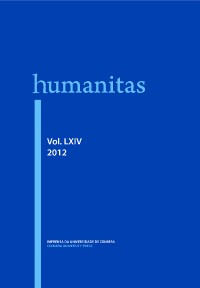Please use this identifier to cite or link to this item:
https://hdl.handle.net/10316.2/27385| DC Field | Value | Language |
|---|---|---|
| dc.contributor.author | Mantas, Vasco Gil | - |
| dc.contributor.other | Faculdade de Letras da Universidade de Coimbra. Instituto de Estudos Clássicos (ed. lit.) | - |
| dc.date.accessioned | 2013-12-19T12:17:59Z | |
| dc.date.accessioned | 2020-10-02T17:03:28Z | - |
| dc.date.available | 2013-12-19T12:17:59Z | |
| dc.date.available | 2020-10-02T17:03:28Z | - |
| dc.date.issued | 2012 | - |
| dc.identifier.issn | 2183-1718 | - |
| dc.identifier.uri | https://hdl.handle.net/10316.2/27385 | - |
| dc.description.abstract | Os miliários não se limitavam a facultar indicações práticas aos viajantes no mundo romano, ainda que a indicação de distâncias fosse a sua função principal. Representaram um elemento próprio de uma paisagem humanizada, na qual a sua presença e as epígrafes que ostentavam contribuiam para a difusão de valores culturais característicos da civilização romana. Por isso, constituem elementos essenciais não só para reconstituir os traçados viários, mas também para ajudar a traçar a história das estradas romanas, assunto nem sempre dos mais fáceis. | por |
| dc.description.abstract | Milestones provided more than practical information to travellers in the Roman world, even though their main function was to present information on distances. They represent a very characteristic element of a humanized landscape, in which their presence and displayed epigraphs contributed to the spread of cultural values proper to Roman civilization. Thus, milestones constitute not only crucial elements for reconstructing the layout of the road network but also help to trace the history of Roman roads, something which is not always easy to accomplish. | eng |
| dc.language.iso | por | - |
| dc.publisher | Imprensa da Universidade de Coimbra | - |
| dc.subject | Milestones | eng |
| dc.subject | Roads | eng |
| dc.subject | Romanization | eng |
| dc.subject | Culture | eng |
| dc.subject | Miliários | por |
| dc.subject | Vias | por |
| dc.subject | Romanização | por |
| dc.subject | Cultura | por |
| dc.title | Os miliários como fontes históricas e arqueológicas | por |
| dc.type | article | - |
| uc.publication.collection | Humanitas vol. LXIV | - |
| uc.publication.firstPage | 139 | - |
| uc.publication.lastPage | 169 | - |
| uc.publication.location | Coimbra | - |
| uc.publication.journalTitle | Humanitas | - |
| uc.publication.volume | 64 | por |
| dc.identifier.doi | 10.14195/2183-1718_64_9 | - |
| uc.publication.section | Artigos | - |
| uc.publication.orderno | 9 | - |
| uc.publication.area | Artes e Humanidades | - |
| uc.publication.manifest | https://dl.uc.pt/json/iiif/10316.2/27385/258023/manifest?manifest=/json/iiif/10316.2/27385/258023/manifest | - |
| uc.publication.thumbnail | https://dl.uc.pt/retrieve/12008504 | - |
| item.grantfulltext | open | - |
| item.fulltext | With Fulltext | - |
| Appears in Collections: | HVMANITAS | |
Files in This Item:
| File | Description | Size | Format | |
|---|---|---|---|---|
| humanitas64_artigo9.pdf | 3.73 MB | Adobe PDF |  |
Items in DSpace are protected by copyright, with all rights reserved, unless otherwise indicated.
